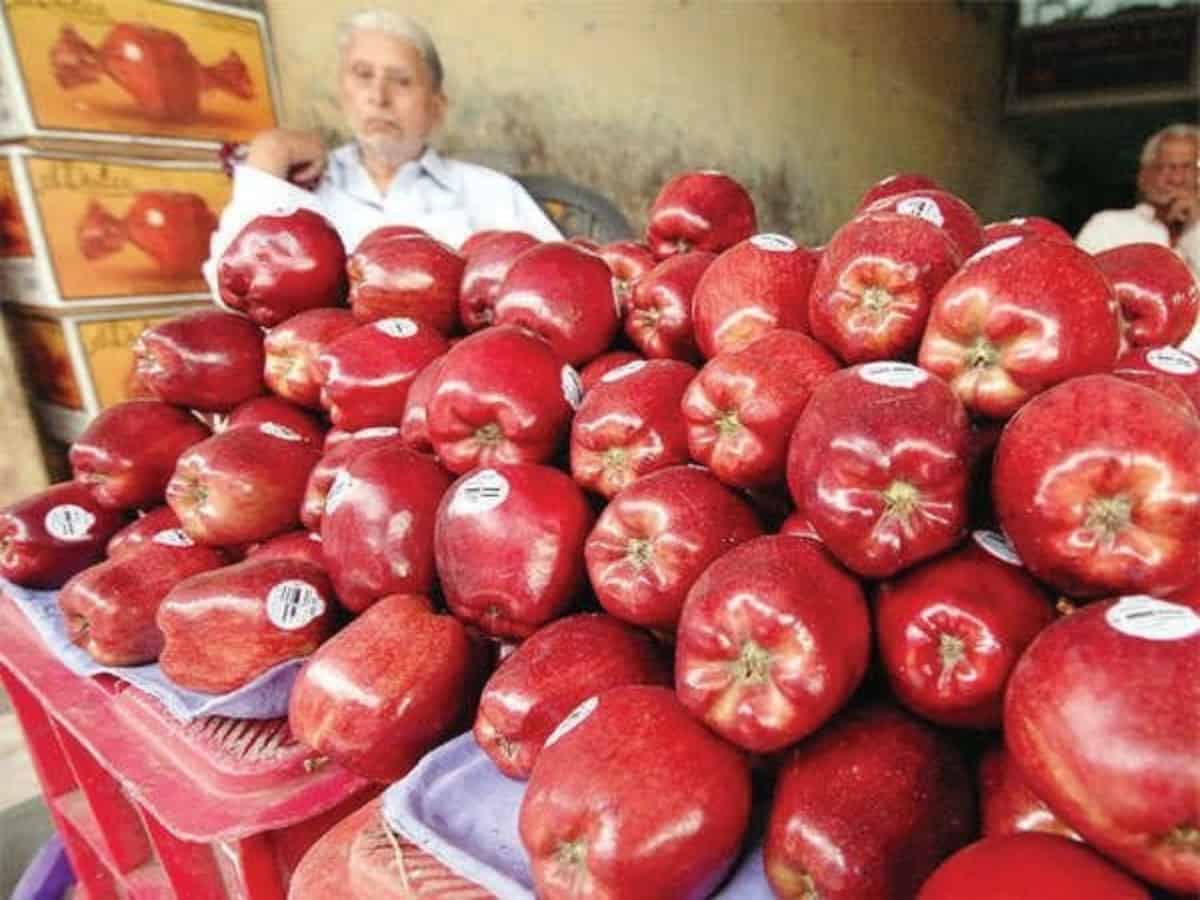
Srinagar: Threatened by an impending disaster to the centuries-old apple industry in Kashmir, local fruit growers have sought intervention by Prime Minister Narendra Modi to stop “illegal entry” of Iranian apples into the Indian markets.
Iranian apples flooding the Indian markets are ‘disguised’ and routed via Afghanistan to avail zero duty under the South Asian Free Trade Area (SAFTA) pact.
SAFTA is an agreement between eight south Asian countries. Afghanistan and India are members of SAFTA and hence, do not impose duty on certain imports from each other.
While Iran is not part of SAFTA, apples from that country reach India via Afghanistan, bypassing import duties.
The result is that while a box of Kashmir apples of good quality costs Rs 1,200 in the terminal markets, its Iranian counterpart costs just Rs 700 per box.
Kashmiri fruit growers have said in their communication to the Prime Minister: “We would like to bring to your kind notice that several fruit traders import and dump Iranian apples arriving via Afghanistan/Dubai in our country and this situation has put the whole of our fruit industry both in J&K (UT) and Himachal Pradesh in a very precarious situation as it has eaten away our share in the market.
“This illegal and unlawful dumping of Iranian apples in our country is not only disastrous for small and marginal growers of J&K (UT)/ Himachal Pradesh but also results in huge losses to the State Exchequer. We request your goodself to impose a ban to restrict the arrival of Iranian apple via Afghanistan/Dubai in our country in order to save the Horticulture Industry of UT of J&K and Himachal Pradesh as well”.
Local fruit growers say over 3 crore apple boxes are lying unsold in the Valley, 1.5 crore of these in various cold storage facilities.
Since legally the Iranian apples do not qualify for zero duty under SAFTA, Kashmir fruit growers have demanded imposition of 100 per cent import duty on these.
Abdul Rashid Lone, an apple orchardist in north Kashmir Kupwara district, says: “The Afghan ‘clothing’ of the Iranian apples is a crime, but more than that, it spells disaster for us. We have to spend a lot of money to afford at least five fungicide/pesticide sprays each year. Add to this the cost of manuring, aerating, watch and ward etc then our cost per box of good quality apple comes to around Rs 200 per box. Then we have to pay for transportation of the produce to the terminal markets. There is no way our quality apples can compete in the market price with the Iranian apples exempted from duty under SAFTA”.
Apart from the Valley, apples are also grown in Himachal Pradesh, Uttarakhand, Arunachal Pradesh and Nagaland. These states also suffer because of the illegal entry of Iranian apple into our markets, says Muhammad Shafi Bhat, another apple grower from north Kashmir Ganderbal district.
Shafi says Iranian apples sell like hotcakes due to lower rates and this has brought down the demand for apples grown in the country.
President of Kashmir Valley fruit growers cum dealers union, Basheer Ahmad Basheer says unless the Iranian apple is lawfully taxed, another two to three years would be enough for the Kashmir apples to vanish from the markets.
Interestingly, contrary to what many people believe, tourism is not the largest industry of Kashmir. It is horticulture and this industry plays a vital role in J&K’s economy, with a yearly turnover of Rs 1,200 crore. It provides direct and indirect employment to about 23 lakh people.
There appears to be some confusion at the official level in J&K about the genuineness of the zero duty status of Iranian apple.
Ajaz Ahmad Bhat, director-general of horticulture (Kashmir), says, “You can’t stop an international treaty and trade”. Fruit growers dismiss the contention because they believe that zero duty accorded to Iranian apple import is neither part of any bonafide trade nor does it come under the SAFTA agreement.

